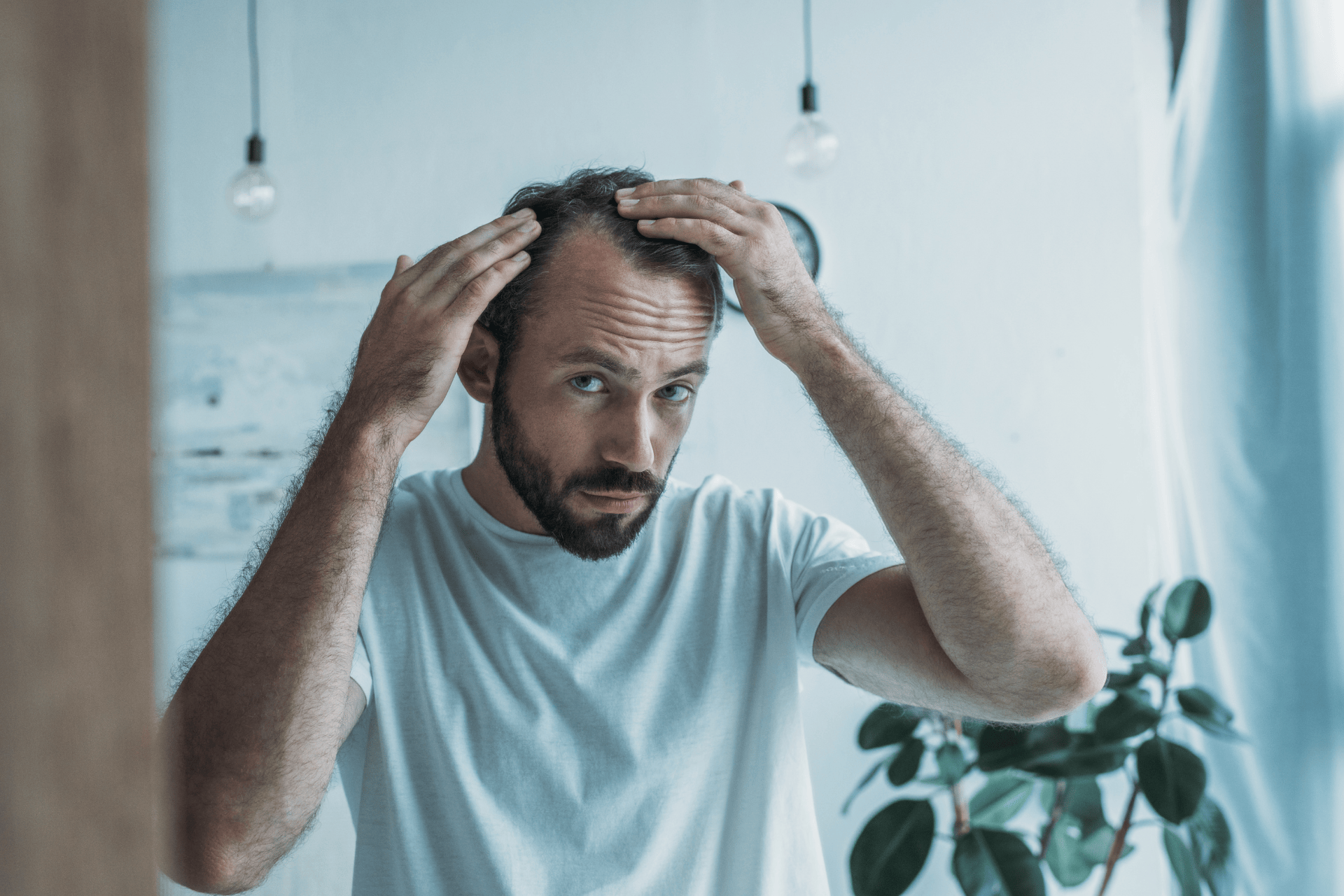How to Prevent Hair Loss While Taking Testosterone
Starting testosterone therapy can bring many changes to your body, but one common concern is hair loss. If you are taking testosterone and worried about thinning hair or a [...]
Read More
Medically reviewed by Alan Lucks | MD, Alan Lucks MDPC Private Practice - New York on November 19th, 2025.
Dihydrotestosterone (DHT) causes follicle miniaturization and hair loss when testosterone converts via the 5-alpha-reductase enzyme—finasteride blocks this conversion by up to 70%.
Dutasteride provides more complete DHT suppression than finasteride by blocking both Type I and Type II 5-alpha-reductase enzymes, though it has a longer half-life of 5 weeks.
Topical minoxidil 5% applied twice daily increases blood flow to follicles and can be combined safely with oral DHT blockers for enhanced protection.
Men with fathers or maternal grandfathers who experienced early balding have an 80% likelihood of similar pattern baldness during hormonal therapy.
Preventive treatment started 2-3 months before beginning testosterone replacement therapy preserves existing follicles more effectively than attempting regrowth after damage occurs.
Starting testosterone therapy can bring many changes to your body, but one common concern is hair loss. If you are taking testosterone and worried about thinning hair or a receding hairline, you are not alone. Understanding why this happens and what you can do to protect your hair can make a big difference.
Testosterone itself is not the direct cause of hair loss. Instead, your body converts some testosterone into a hormone called dihydrotestosterone, or DHT. DHT binds to hair follicles and can shrink them, making hair thinner and eventually stopping new hair growth. This process is called androgenic alopecia, or male pattern baldness, and it affects many people taking testosterone. The impact of DHT on hair follicles is particularly pronounced in areas of the scalp that are genetically predisposed to hair thinning, leading to a characteristic pattern of hair loss that many individuals recognize.
Interestingly, DHT is not solely responsible for hair loss; it also plays a role in other bodily functions, such as the development of male characteristics during puberty. However, the balance between testosterone and DHT is crucial. Research has shown that individuals with higher levels of DHT relative to testosterone may experience more significant hair loss. This has led to the exploration of treatments that can inhibit the conversion of testosterone to DHT, such as finasteride, which has been shown to help mitigate hair loss in some individuals.
 Genetics Matter
Genetics MatterNot everyone who takes testosterone will lose hair. Your genetic makeup plays a big role in how sensitive your hair follicles are to DHT. If close family members have experienced hair loss, you might be more likely to notice it during testosterone therapy. The genetic factors influencing hair loss are complex and involve multiple genes that can dictate the sensitivity of hair follicles to hormonal changes. This means that even within families, the degree of hair loss can vary significantly from one person to another.
Moreover, studies have identified specific genetic markers that can predict the likelihood of androgenic alopecia. For instance, variations in the AR gene, which encodes the androgen receptor, can influence how effectively DHT interacts with hair follicles. This genetic predisposition can lead some individuals to experience hair loss at an earlier age or more aggressively than others. Understanding these genetic links can help individuals make informed decisions about their treatment options and manage expectations regarding hair loss during testosterone therapy.
Before starting testosterone, it is a good idea to discuss your hair loss risk with a healthcare professional. They can help you understand your options and monitor your hair health as you begin treatment. Telehealth services like Doctronic.ai offer easy access to doctors who specialize in hormone therapy and hair health, making it simple to get advice without leaving home. These consultations can provide you with personalized strategies tailored to your specific health profile, ensuring that you are fully informed about the potential impacts of testosterone on your body, including hair loss.
Some medications can reduce the effect of DHT on your hair follicles. Two common options are finasteride and dutasteride. These drugs lower DHT levels and can slow or stop hair loss for many people. It is important to use these under medical supervision because they can have side effects and are not right for everyone. Furthermore, discussing the potential benefits and risks with your doctor can help you make an informed decision, as some individuals may experience significant improvements while others might not see the desired results. Regular follow-ups can also help in adjusting dosages or exploring alternative treatments if necessary.
Minoxidil is a popular topical treatment that helps stimulate hair growth. It does not affect hormones but can improve blood flow to hair follicles and encourage thicker hair. Applying minoxidil regularly may help maintain your hair while on testosterone. It's worth noting that consistency is key with topical treatments; many users see results only after several months of regular application. Combining minoxidil with other therapies, such as low-level laser therapy, may enhance its effectiveness, providing a multifaceted approach to hair preservation.
Good nutrition, regular exercise, and managing stress all support healthy hair. Eating foods rich in vitamins like biotin, vitamin D, and iron can strengthen hair. Avoiding smoking and excessive alcohol also helps keep your hair in better condition. Incorporating a balanced diet filled with antioxidants can also combat oxidative stress, which is known to affect hair health. Moreover, engaging in stress-reducing activities such as yoga, meditation, or even hobbies you enjoy can significantly improve your overall well-being, which in turn can have a positive impact on your hair growth journey.
Hair loss can start slowly, so regular monitoring is key. Take photos of your hair every few months to track any changes. If you notice thinning, contact your healthcare provider quickly to adjust your treatment plan.
Doctronic.ai provides access to doctors who understand the effects of testosterone on hair. They can offer personalized advice, recommend treatments, and help you manage side effects without needing in-person visits.
Harsh shampoos and frequent heat styling can weaken hair. Use mild, sulfate-free shampoos and avoid excessive blow-drying or straightening. Treat your hair gently to reduce breakage.
Styles that pull on your hair, like tight ponytails or braids, can cause traction alopecia. This type of hair loss adds to the problem, so opt for loose hairstyles instead.
Some supplements claim to support hair growth, but not all are proven effective. Always check with your doctor before starting any new vitamins or herbal products, especially while on hormone therapy.
Rapid or patchy hair loss
Scalp irritation or redness
Hair loss accompanied by other symptoms like fatigue or weight changes
If you experience these, it is important to get medical advice. Early intervention can improve outcomes.
 How Doctronic.ai Can Help
How Doctronic.ai Can HelpDoctronic.ai offers 24/7 telehealth visits with licensed doctors across all 50 states. They provide affordable, convenient care for patients on testosterone therapy who want to manage hair loss. Using AI-powered tools, Doctronic doctors can quickly assess your situation and recommend treatments tailored to your needs.
Hair loss is common among people taking testosterone, but it can be managed with the right approach. Many users of testosterone therapy successfully maintain their hair by combining medical treatments and lifestyle changes.
Your well-being goes beyond hair. Stay connected with healthcare providers and use Doctronic.ai to support your health journey. Taking care of your body and mind will help you feel your best.
Testosterone can speed up hair loss in people genetically prone to it. While some hair loss may be permanent, early treatment can slow or stop the process.
In many cases, hair loss can be slowed or partially reversed with medications like finasteride or minoxidil, especially if started early.
Yes, but always consult your doctor first. Some medications may interact or have side effects that need monitoring.
Maintaining a healthy diet, reducing stress, and gentle hair care can help, but they may not be enough alone if you have a strong genetic tendency.
Telehealth platforms like Doctronic.ai provide expert care and advice without needing to visit a clinic in person.
Hair loss can feel frustrating, but it does not have to be inevitable. With the right knowledge and support, you can protect your hair while benefiting from testosterone therapy. Reach out to healthcare professionals early, consider medical treatments, and maintain healthy habits. Platforms like Doctronic.ai make it easier than ever to get personalized help whenever you need it.
Starting DHT-blocking medications before testosterone therapy offers the best protection against hair loss, especially for men with family history of balding. Combining finasteride or dutasteride with topical minoxidil provides comprehensive follicle protection during hormonal treatment. If you're considering testosterone therapy and want to preserve your hair, Doctronic can connect you with specialists to develop a prevention strategy.
Starting testosterone therapy can bring many changes to your body, but one common concern is hair loss. If you are taking testosterone and worried about thinning hair or a [...]
Read More